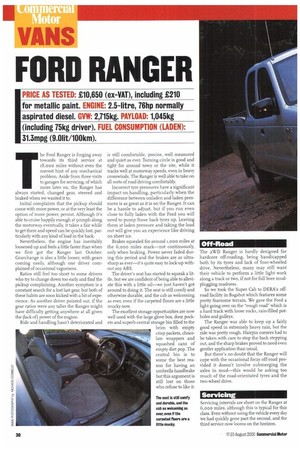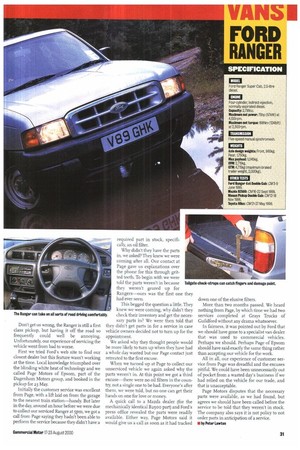FORD RANGER
Page 32

Page 33

If you've noticed an error in this article please click here to report it so we can fix it.
IPRICE AS TESTED: £10,650 (ex-VAT), including 1210 for metallic paint. ENGINE: 2.5-litre, 76hp normally aspirated diesel. CR: 2,715kg. PAYLOAD: 1,045kg (including 75kg driver). FUEL CONSUMPTION (LADEN): 31.3mpg (9.01it/100km).
The Ford Ranger is forging away towards its third service at i 8,00 o miles without even the merest hint of any mechanical problem. Aside from three visits to garages for servicing, of which more later on, the Ranger has always started, changed gear, steered and braked when we wanted it to.
Initial complaints that the pickup should come with more power, or at the very least the option of more power, persist. Although it's able to cruise happily enough at gomph along the motorway eventually, it takes a fair while to get there and speed can be quickly lost, particularly with any kind of load in the back.
Nevertheless, the engine has inevitably loosened up and feels a little faster than when we first got the Ranger last October. Gearchange is also a little looser, with gears coming easily, although one driver complained of occasional vagueness.
Ratios still feel too short to some drivers who try to change down too early and find the pickup complaining. Another symptom is a constant search for a lost last gear, but both of these habits are soon kicked with a bit of experience. As another driver pointed out, if the gear ratios were any taller the Ranger might have difficulty getting anywhere at all given the (lack of) power of the engine.
Ride and handling hasn't deteriorated and is still comfortable, precise, well measured and quiet as ever. Turning circle is good and tight for around town or the site, while it tracks well at motorway speeds, even in heavy crosswinds. The Ranger is well able to take on all sorts of road driving comfortably.
Incorrect tyre pressures have a significant impact on handling, particularly when the difference between unladen and laden pressures is as great as it is on the Ranger. It can be a hassle to adjust, but if you run even close to fully laden with the Ford you will need to pump those back tyres up. Leaving them at laden pressure and taking the load out will give you an experience like driving on sheet ice.
Brakes squealed for around Locio miles at the 6,000 miles mark—not continuously, only when braking. Power never faded during this period and the brakes are as ultrasharp as ever—it's quite easy to lock-up without any ABS.
The driver's seat has started to squeak a little, but we are confident of being able to alleviate this with a little oil—we just haven't got around to doing it. The seat is still comfy and otherwise durable, and the cab as welcoming as ever, even lithe carpeted floors are a little mucky now.
The excellent storage opportunities are now well used with the large glove box, door pockets and superb central storage bin filled to the brim with empty crisp packets, chocolate wrappers and squashed cans of empty diet pop. The central bin is to some the best reason for having an umbrella handbrake but this argument is still lost on those who refuse to like it
Off-Road
The 2WD Ranger is hardly designed for hardcore off-roading, being handicapped both by its tyres and lack of four-wheeled drive. Nevertheless, many may still want their vehicle to perform a little light work along a track or two, if not for full bore mudplugging madness.
So we took the Super Cab to DERA's offroad facility in Bagshot which features some pretty fearsome terrain. We gave the Ford a light going over on the "rough roadwhich is a hard track with loose rocks, rain-filled potholes and gulleys.
The Ranger was able to keep up a fairly good speed in extremely heavy rain, but the ride was pretty rough. Hairpin corners had to be taken with care to stop the back stepping out, and the sharp brakes proved to need even gentler application than usual.
But there's no doubt that the Ranger will cope with the occasional foray off-road provided it doesn't involve submerging the axles in mud—this would be asking too much of the road-orientated tyres and the two-wheel drive.
Servicing
Servicing intervals are short on the Ranger at 6,000 miles, although this is typical for this class. Even without using the vehicle every day we had quickly gone past the second, and the third service now looms on the horizon. Don't get us wrong, the Ranger is still a first class pickup, but having it off the road so frequently could well be annoying. Unfortunately, our experience of servicing the vehicle went from bad to worse.
First we tried Ford's web site to find our closest dealer but this feature wasn't working at the time. Local knowledge triumphed over the blinding white heat of technology and we called Page Motors of Epsom, part of the Dagenham Motors group, and booked in the pickup for 23 May.
Initially the customer service was excellent from Page, with a lift laid on from the garage to the nearest train station—handy. But later in the day, around an hour before we were due to collect our serviced Ranger at 5pm, we got a call from Page saying they hadn't been able to perform the service because they didn't have a required part in stock, specifically, an oil filter.
Why didn't they have the parts in, we asked? They knew we were coming after all. Our contact at Page gave us explanations over the phone for this through gritted teeth. To begin with we were told the parts weren't in because they weren't geared up for Rangers—ours was the first one they had ever seen.
This begged the question a little. They knew we were coming, why didn't they check their inventory and get the necessary parts in? We were then told that they didn't get parts in for a service in case vehicle owners decided not to turn up for the appointment.
We asked why they thought people would be more likely to turn up when they have had a whole day wasted but our Page contact just retreated to the first excuse.
When we turned up at Page to collect our unsenriced vehicle we again asked why the parts weren't in. At this point we got a third excuse—there were no oil filters in the country, not a single one to be had. Everyone's after them, we were told, but no one can get their hands on one for love or money.
A quick call to a Mazda dealer (for the mechanically identical B2.5oo part) and Ford's press office revealed the parts were readily available. Either way, Page Motors said it would give us a call as soon as it had tracked down one of the elusive filters.
More than two months passed. We heard nothing from Page, by which time we had two services completed at Grays Trucks of Guildford without any drama whatsoever.
In fairness, it was pointed out by Ford that we should have gone to a specialist van dealer that was used to commercial vehicles. Perhaps we should. Perhaps Page of Epsom should have said exactly the same thing rather than accepting our vehicle for the work.
All in all, our experience of customer service from Page was dreadful and the excuses pitiful. We could have been unnecessarily out of pocket from a wasted day's business if we had relied on the vehicle for our trade, and that is unacceptable.
Page Motors disputes that the necessary parts were available, as we had found, but agrees we should have been called before the service to be told that they weren't in stock. The company also says it is not policy to not order parts in anticipation of a service.
• by Peter Lawton




































































































